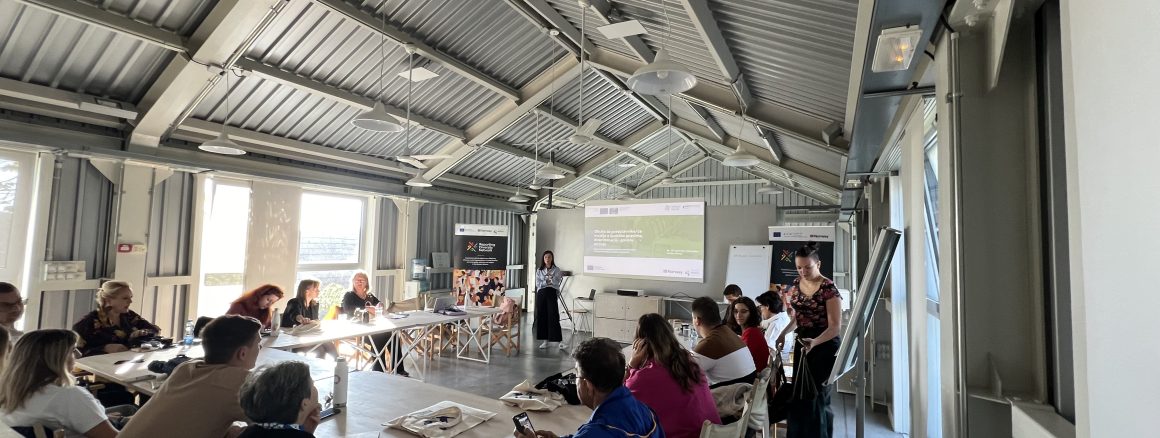Empowering journalists for responsible reporting on human rights
September 26, 2024
September 26-27, 2024 – Mokrin, Serbia
Taking another step towards responsible and ethical media reporting on marginalised groups in the Western Balkans, the Reporting Diversity Network hosted an impactful training for journalists from September 25 to 27, 2024, in Mokrin, Serbia. This initiative, organised by the Media Diversity Institute Western Balkans in collaboration with the Council of Europe and the Commissioner for the Protection of Equality, aimed to enhance journalists’ understanding of human rights issues, particularly focusing on gender representation, gender identity, and sexual orientation.
The training dealt with issues of unequal representation of women, gender and gender identity, and sexual minorities in the media, as well as discrimination and hate speech against these groups present in the Western Balkans media landscape. Journalists and media workers from youth and local media outlets, as well as media reporting on the languages of national minorities, participated in the training providing their perspectives and discussing challenges they face in reporting on marginalised groups.
The training began with a creative workshop organised in the Center for Fine and Applied Arts Terra, on the occasion of the European Day of Languages, where participants got the opportunity to get to know each other and bond while exploring their creativity through pottery.
Later, discussions facilitated by journalists Danica Ilić and Miloš Ćirić explored the crucial role of media in promoting human rights and combating hate speech and discrimination in the media. Aleksandra Dimitrijević from the Council of Europe presented comprehensive guidelines for addressing hate speech. Ivana Kristić, a professor from the University of Belgrade, highlighted the existing normative frameworks aimed to protect against discrimination, while Ivana Jelača, on behalf of Media Diversity Institute Western Balkans presented RDN findings in Serbia and key challenges that the RDN monitoring team encountered. Participants shared their insights on maintaining high ethical standards in reporting. A panel discussion on social diversity followed, adding value to the training by ensuring contact between the activists and journalists, encouraging collaboration between the two, and providing ideas to journalists. The panel featured activist and social media influencer Nikolina Pavićević (@kriticki), who discussed reporting on women’s rights and gender-based violence; Matea Stefanovic (Talas TIRV) who talked about reporting about the transgender community, and Zorica Šurlan (Roma Association Novi Becej) who focused on issues in reporting about Roma community, particularly Roma women. These conversations, which sparked significant interest of participants, further emphasised the need for nuanced media coverage of marginalised groups.
After practical sessions on story development and pitching ideas, the training concluded with a commitment to ongoing education and mentorship, ensuring participants will continue to refine journalism skills focused on human rights reporting. This online mentoring process will support the creation and publication of impactful media content within their respective newsrooms.
See testimonials of our participants:
Similar trainings have or will take place in other Western Balkans countries, on 3-4 October in Albania and North Macedonia, 7-8 October in Montenegro and 17-18 October in Bosnia and Herzegovina.
Following the national trainings, an advanced, regional training will follow. The date set for the advanced training is October 21-22 and it will take place in Durres, Albania.
A media content production phase will follow each training, while several cross-border stories will be encouraged after the Advanced training. In that way, RDN will ensure the production of content focused on the human rights of marginalised communities, but also the collaboration of journalists working in different Western Balkans countries.
The Reporting Diversity Network strives to cultivate a media landscape that promotes diversity, fosters understanding, and counters hate speech across the Western Balkans. Equipping journalists with the necessary tools and knowledge to report diversity will contribute to this goal. As the Network continues to grow, it is poised to play a pivotal role in shaping a more inclusive and welcoming society for all citizens regardless of their diversity.
The training in Serbia is organised in collaboration between Reporting Diversity Network, supported by the European Union and SMART Balkan – Civil Society for Shared Society in the Western Balkans, a regional project implemented by the Center for the Promotion of Civil Society (CPCD), the Center for Research and Policy Making (CRPM) and the Institute for Democracy and Mediation (IDM) and financially supported by the Norwegian Ministry of Foreign Affairs, and the projectCombating discrimination and promoting diversity in Serbia, which is part of the joint programme of the European Union and the Council of Europe “Horizontal Facility for the Western Balkans and Türkiye”, in cooperation with the Commissioner for the Protection of Equality.
